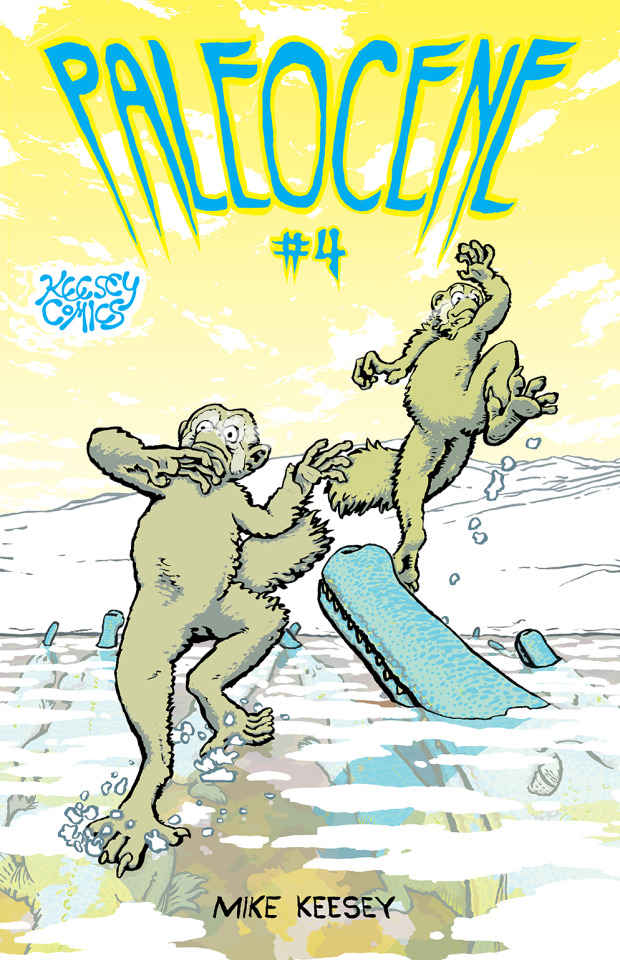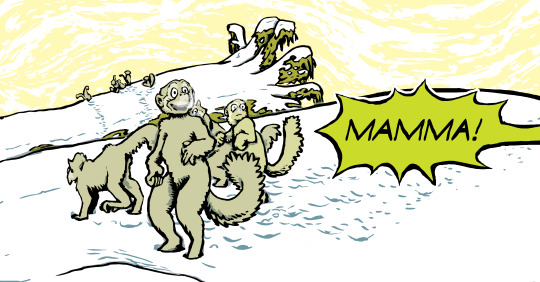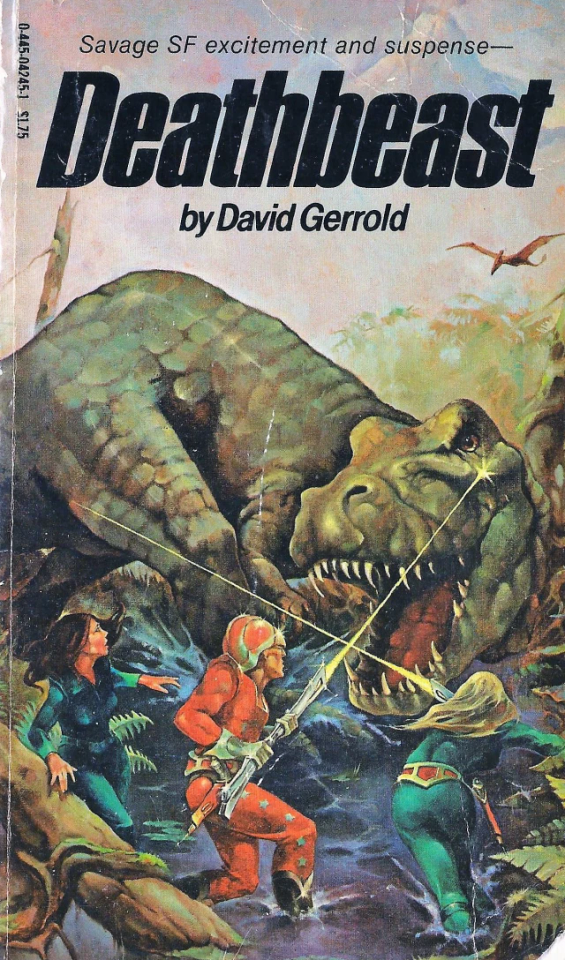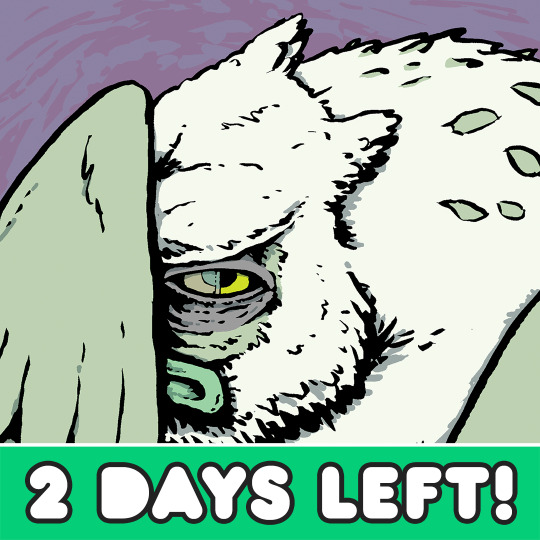#paleofiction
Explore tagged Tumblr posts
Text
Creature Fantasy Writing Tips #1 Sentient and Sapient are Different Words (and You Probably Mean Sapient).
There aren't a lot of resources devoted to writing creature fantasy, animal fiction, xenofiction, or similar human-free works, and I thought I'd help out a little by offering a few tips. My goal here isn't to judge or tell you that you're doing it wrong, but instead, I'd like to help you avoid a few pitfalls or give you more options as a writer. I'm also writing these after my brain is fried from getting my novel work done for the day, so hopefully this'll be coherent and fairly typo-free. With that in mind, here's your first tip. Sentience implies an awareness of self as an organism, while sapience implies wisdom, creativity, and near-ish human levels of intelligence. I think what throws people here is all those scifi documentaries about the "search for sentient life" in the cosmos. That phrase doesn't mean they're searching for little grey men with UFOs, it means they're searching for life larger than single-celled organisms.
If you sit outside reading this, turn around, and see that a squirrel has stolen your lunch, it is accurate for you to say "my sandwich was stolen by sentient squirrels." But if the squirrel shouts insults at you, came up with an elaborate plan to steal your sandwich, and this is part of the squirrel's four-year-plan to control sandwiches in your city, the squirrel is sapient. (It's also sentient, but since all squirrels as we know them are sentient, it'd be redundant to mention that.)
"So how far down do you have to go before life stops being sentient?" I've seen studies on sentience in beetles, so I'd assume below insects.
"Wait, but then.... where is the line between sentience and sapience?" This is a little tougher. Are crows, dolphins, gorillas, or whales sapient? It's a topic for debate, and rather than give you an answer, you can use those as an example of what the line looks like in your own writing.
This distinction can feel a bit pedantic, especially when your favorite scifi and fantasy writers are probably getting it wrong all the time. The thing about creature fantasy fans, though, is that they're here for sapient non-human protagonists, and they know the distinction. You will get angry letters if you mix these up.
That said... if you are writing sentient xenofiction, that's okay! Your audience may be smaller, but a book like Raptor Red by Dr. Robert T. Bakker was immensely popular and influential despite having just a normal Utahraptor as the protagonist. Depending on how you write them, you may get some claims that you're anthropomorphizing your characters. Maybe you want that, maybe you don't. That's entirely up to you. We'll talk about anthropomorphism and disanthropomorphism later on.
That's it for tip #1 =] Just a simple pitfall that writers find themselves in. I apologize ahead of time as you're going to see a lot of non-creature scifi/fantasy fans and authors say sentient when they mean sapient, and it's going to start to irk you as you fix it in your own writing. Just remember to be kind =] Unless you're in a situation where the difference matters, it's probably best to let it slide if someone uses sentience where they mean sapience. If anyone has any questions about how creature fantasy, xenofiction, furry fiction, or animal fantasy differs from other genres, feel free to ask any questions, and I'll try to answer them.
95 notes
·
View notes
Text
So let's say you're out exploring...
Heading to some dungeon someplace, or just on a general quest, whatever gets you out into the subtropical forests. You come through a clearing, and suddenly you're face to face with an ogre.
Now, your first instinct upon seeing the shaggy, vaguely man-like giant with its gangly arms and mouth of fangs is going to be to draw steel on it. This is what is generally referred to as "a mistake."
An ogre's reach, strength and endurance far outclass your own, and they use makeshift clubs with frequency.
But most importantly, combat is rarely needed to deal with these creatures. Contrary to reputation, they rarely seek out meat, preferring fruits and soft plants. Nor are they enraged by joy and happiness, as many a fool bard prattles on about.
The open mouth smile is considered a threatening gesture to these creatures, as it is a prelude to combat between them. If encountering an ogre, it is best to slowly back away while making yourself as small and nonthreatening as you can, and do not look the beast in the eyes.
Ogres will rarely pursue a nonthreatening humanoid that is leaving their territory.
A pursed lip, 'kissing' expression appears to be a signal of friendliness, and can be used to signal you are not a threat. If an ogre returns this gesture, maintain a polite distance. When they aren't seen as threat, smaller humanoids come across as children to ogre perception. Tales of 'ogre wives' capturing burly warriors and offering them a 'wedding feast' of fruit, insects and strange plants are not, in fact, captives of a lovesick monster.
Rather, the warrior in question has been mistaken for a particularly inept and helpless ogre child (or something close enough to adopt) and is being fed on the assumption they don't yet know how to gather their own food. The 'jealous, watchful eye' of the ogre is more likely the same kind of watchful concern one gives a clumsy or easily distracted child.
As such, it's best to not get 'adopted' in the first place.
--
On Ogres, by Maudlin Dirge, 1572 E.E.
44 notes
·
View notes
Text

The front cover for my upcoming comic book, Paleocene #4. Check out the campaign to get it printed!
Sixty-six million years ago, the world ended.
A meteorite over ten kilometers in diameter slammed into the Earth. The explosion released two million times as much energy as the largest nuclear bomb ever detonated. All life in the vicinity was instantly obliterated.

For the rest of the world, death was slower. A shroud of soot and dust engulfed the Earth. Without sunlight, plants withered and died, setting off a domino effect up the food chain, all the way to mighty predators like Tyrannosaurus rex. Three quarters of all life on Earth perished, starving in the darkness.
But we survived.
Not “we” as in humankind. This was much earlier. But our early primate ancestors—they persisted. With clutched hands and shining eyes, they witnessed the end of the world … and the early dawn of a new one.

What's in the new issue?
After witnessing a predatory bird devour their fellow troop member, Mamma and Brother continue their search for Sister … now in the freezing cold of winter.
Could the little child possibly have survived? What will happen to Auntie and the rest of the troop in their absence? And, as Brother grows up, will he stay with his Mamma?
If you've been following the story so far, you'll definitely want to read this one, because, I promise, you will finally discover Sister's fate!

#paleontology#comic covers#comicart#comics#dinosaur#paleoart#palaeoblr#primates#evolution#fossils#prehistoric#biology#zoology#paleofiction#cenozoic#palaeontology#paleocene#reptile#comic books#dinos and comics#comic art#extinction#deep time
142 notes
·
View notes
Text

Read in 2023
Deathbeast by David Gerrold 1978
5/10
#deathbeast#tyrannosaurus#tyrannosaurus rex#t. rex#t rex#dinosaurs#dinosaur#paleofiction#time travel#science fiction#sci fi#70's sci fi#1978
59 notes
·
View notes
Text

i love you wikipedia writers who know a humorous turn of phrase and comedic beat
4 notes
·
View notes
Text
The tyrant king awoke. He tiredly slunk from his jungle abode and into the foggy morning light, tail ungracefully dragging over the dead logs and debris as he lumbered.
Yesterday’s supper clung around his dribbling mouth, and with the shake of his massive, boxy head, he threw off the entourage of flies he’d accumulated.
#microfiction#retrosaurs#retrosaur#paleofiction#xenofiction#a painting will later accompany this#back on my vintage dino BS lol#my interests are vast#and prone to changing at the drop of a hat
9 notes
·
View notes
Text
I was recently reminded that I published a book
I mean, yes it's true, I write crap all the time for free, but a few years ago I wanted to give the self-publishing gig a try after I wrote this:

I made a sale out of the blue last week and was reminded oh yeah, I did write that. Thanks, kindly rando. You were either very misguided or you confused my book with something else, but I thank you.
But anyway. This story is quite different from what I write now, just so you know. Peter Lorre and his many inspired characters make no appearance here. Instead most of the characters were inspired by my favorite prog musicians. I like to think my writing has improved somewhat since I finished this story, but I don't hate it. Someday I may return to this universe (I did finish about half of a sequel before I realized Peter Lorre was the true muse I really wanted to write about). But if you would like to read about young prog rockers of the Iberian Peninsula 20,000 years ago, then uh, I guess this is for you! :)
Secretly I would love to publish more physical editions of all my PL fiction, but know that I am not nearly motivated nor mentally well enough to deal with the sucking morass that is modern publishing. If someone out there is already part of that morass and is willing to give this mad author a chance at that sweet cheddar (as if anyone without the initials JKR makes the big money in this business, bwahaha) then do let me know to whom I must abase myself. Otherwise leave me alone to write my crap in relative peace.
#writing#publishing#paleofiction#the worm and the doe#also available on kindle somewhere at that link#most days I literally forget I ever wrote this even though it took a few years to finish#I write slooow
3 notes
·
View notes
Text

Samuel Grant is a mercenary from "The Undead World" hired by Ghost along with Robin to aid his expedition before meeting an unfortunate end once they get there.
Artwork belongs to @emeraldkamala
0 notes
Note
Hello! I have two other very good paleofiction books that you might enjoy. They are Moctu and the Mammoth People and it's sequel The People Eaters, by Neil Bockoven, and Jih's Journey by Xavier Giovanni McClean.
I haven't heard of these before! Thank you for telling me about them! I'll add these books to the paleolithic fiction catalogue, too :) I've been looking for a fiction book to read, so I'll start with one of your suggestions!
18 notes
·
View notes
Text

I'm leading a show and tell event this year!
For all the artists who will come to #Tetzoocon! Show us your art! All media possible, you want to read from your new paleofiction, show a video, explain a painting project? Please do!
More about Tetzoocon here: https://tetzoo.com/convention
38 notes
·
View notes
Quote
The descendant of an Alpine St. Bernard and a Scotch shepherd dog, Buck is frequently contrasted with other dogs representing ethnic types associated with effeminate, depraved, or servile characteristics... Like Wilbur’s fight with the Chinese beachcomber, this scene stages Buck’s natural superiority to the Yeehats. The latter are not only incompetent in physical combat, but intellectually and spiritually confounded by Buck’s speed: they unwittingly slaughter each other, give way to panic, and then come up with a supernatural explanation for their shortcomings. A second indigenous massacre soon follows: Buck kills several native timber wolves before their pack recognizes him as their new leader. These massacres of indigenous Northland men and dogs appear to contradict the novel’s claims about the strengthening qualities of frontier experience: if struggling in this extreme environment is what makes Buck so physically virtuosic, then why hasn’t it had a comparable effect on the Yeehats and timber wolves who have spent generations there? Rather than deriving entirely from his changed environment, Buck’s abilities are the product of heredity and environment. London describes Buck as the only Southland dog imported to the Yukon who had ever “shown up worthily in camp and on trail. They were all too soft, dying under the toil, the frost, and starvation. Buck was the exception”. Buck’s European stock (which, based on his breeding, could be read as an allegory for Swiss and Scottish immigrants to the US) makes him a racial exception, and that exceptional white atavism is what enables him to defeat indigenous men and wolves once the Northland climate has awakened his primal resources. Despite London’s interest in environmental determinism, these concluding scenes suggest that the influence of ancestry is even stronger, as extreme environments call forth Buck’s superior hereditary resources. The novel’s dramatization of racial struggle—along with the novel’s repeated references to “the dominant primordial beast” — echo Friedrich Nietzsche’s account of an atavism—“the splendid blond beast [that] has to get out again and go back to the wilderness”—available only to specific “noble races” ranging from the Romans, Arabians, and Japanese nobility to the Vikings. Whereas nineteenth-century anthropologists depicted women, indigenous populations, racialized immigrants, and African Americans as living fossils prone to irrational, brutal tendencies, the climactic scenes of Moran and Call stage an exceptional white atavism in which Euro-American heroes access their own primitive resources. Unlike the atavistic states attributed to women and racialized groups, however, atavistic white males retain their reason and self-restraint: . In these novels, Paleolithic episodes involving physical struggle, barefoot running, hunting, and wilderness survival counteract racialized and gendered threats of “race suicide” by calling forth primal resources imagined to be the racial inheritance of white American men.
Hsuan L. Hsu, Paleo-Narratives and White Atavism, 1898–2015
4 notes
·
View notes
Text
Paleofiction Subgenres
The first post is up on the new Thagomizers blog! It's all about paleofiction and its various sub-genres.🦖📚🎬🎮
Check it out here and let me know what you think:
152 notes
·
View notes
Text

Two days left and 85% funded! Now’s the time to back PALEOCENE, the comic book series set 66 million years ago. https://www.kickstarter.com/projects/keesey/paleocene-4-comic-book
kickstarter
#paleontology#extinction#palaeontology#paleoart#prehistoric#comicart#comics#biology#comic books#paleofiction
73 notes
·
View notes
Note
Aside from The Land Before Time, Jurassic Park/World, Saurian, Prehistoric Kingdom and Walking with Dinosaurs, what other pieces of Paleofiction would you guys recommend?
33 notes
·
View notes
Photo

Polacanthids, Nikolai Litvinenko
Early every summer, as the days begin to shorten, the pod migrates along the shifting line where sea meets land. In the northlands, they flirt and mate and deposit eggs in heaps of dirt and vegetation, then trudge south. The eggs will hatch unobserved, the babies grow unaccompanied, never knowing siblings from cousins from strangers. Those that survive infancy join the pod when it returns the following year.
And here, on the beach, with night-chilled sand between her toes, and the scent of sea salt on her breath, and the cries of the waves in her ears, the cow approaches a pile of white, picked clean by crabs and bleached by sun, jumbled on the shore like an afternoon’s collection of seashells discarded by a mother when her child wasn’t looking. The sight is unnerving to the dinosaur, but not haunting. With a cough, she adjusts her path and plods around the bones, never knowing the skeleton once belonged to her sister.
110 notes
·
View notes
Text
The two stood puzzled, watching what should have been a nice afternoon snack——their rightful catch——disappear further into the clouds above the dune fields. That pterosaur had come out of nowhere! After a moment of quiet bristling, the spindly dromaeosaurs exchanged a glance, and then immediately squabbled amongst themselves. It had to be one of their faults, someone had to take the blame and get their minds off their hungry bellies.
#microfiction#paleofiction#xenofiction#retrosaurs#retrosaur#this is probably gonna be a daily thing#gotta brush up on my writing#seize the day or whatever
2 notes
·
View notes